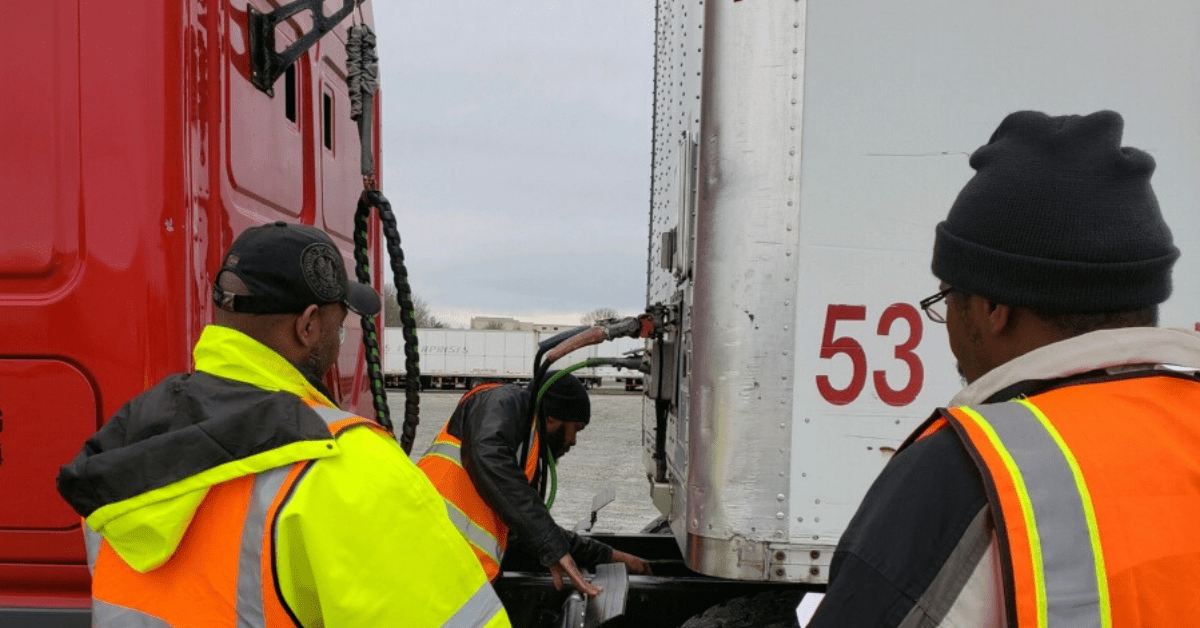
CDL Practice Tests

Free CDL Practice Tests
—
Use our free CDL practice tests to prepare for the CDL written exam. We offer a practice test for each of the three parts of the exam, including General Knowledge, Air Brakes and Combination Vehicles. These CDL practice tests simulate the types of questions you might see when you take the tests at the DMV office. Take these free CDL practice tests as often as you like to improve your score.

CDL General Knowledge Practice Test

Tanker Endorsement Practice Test

Combination Vehicle Practice Test

Hazmat Endorsement Practice Test

Air Brakes Practice Test

TEXas CDL Practice TestS

Missouri CDL Practice TestS

Ohio CDL Practice TestS

Illinois CDL Practice TestS

kansas CDL Practice TestS

South Carolina CDL Practice TestS

kentucky CDL Practice TestS

Oklahoma CDL Practice TestS
Free CDL Practice Tests
—
What’s on the CDL Permit Exam?
The official written CDL permit test is comprised of multiple-choice questions used to assess your knowledge of driving a commercial vehicle. This includes everything from driving laws to operating your vehicle in different situations and knowing how to inspect and ensure you vehicle is safe to operate.
The CDL permit exam is broken into three parts:
- General Knowledge – approximately 50 questions.
- Air Brakes – approximately 25 questions.
- Combination Vehicles – approximately 25 questions.
The number of questions per test may vary slightly depending on your state. You must pass all three parts of the exam with an 80% score to get your Commercial Learner’s Permit. With your Commercial Learner’s Permit (CLP) you can then begin behind-the-wheel CDL training.
How to Study for the CDL Exam?
To help you prepare for this comprehensive exam, take our free CDL Practice Tests. These tests will give you can idea of what is on the test and what areas you need to improve. With a little test prep and training from a DRC network school, you’ll go from studying for your permit to being a fully licensed class a cdl driver.
They key to passing any test is studying to ensure you are prepared come test day. Here are some tips and tricks to help you get ready:
Take practice tests. A lot of people take this step, but they don’t always realize how important it is. A practice test will give you an idea of what kinds of questions are on the actual exam so that when it comes time for real, all those hours spent studying will be well worth it.
Study your handbook (or driver manual). Everything you need to know to pass the CDL exam is in your state’s driver manual. Therefore, studying the manual is essential. Some ways to study the material include creating flash cards and breaking the material into smaller chunks. Don’t try to learn the manual all at once.
Study with a partner. Team up with another student to review questions. Let’s be honest, finding the motivation to study can be difficult. Often teaming up with another student or friend can be mutually beneficial. This allows you to hold one another accountable for studying.
Why is Taking a CDL Practice Test a Good Idea?
The CDL Practice Test is a good idea because it can help you identify where your strengths and weaknesses lie. You will be able to see if you have mastered the topics that are tested on the real thing or if there are some areas that need more studying. It also gives you confidence as you get closer to test day.
Do I need to Study for the CDL Exam Before CDL School?
The first step in getting a CDL is to get a Commercial Learner’s Permit. This includes passing all three-parts of the CDL permit test. While it is beneficial to have your CLP before enrolling in CDL school it is not required. Part of CDL training will include preparing you for the CDL permit test.
We do recommend reviewing the CDL manual and taking a CDL practice test before coming to school. This will give you an idea of the material covered and give you a leg up.
How Long Should I Study for the CDL Permit Exam Before Taking the Test?
The amount of time needed to study for the CDL permit exam varies from person to person, depending on prior knowledge and experience with driving regulations. However, most candidates benefit from studying for at least a week before attempting the test.
How Many Times Can I Take the CDL Permit Exam if I Fail?
If you don’t pass the CDL permit exam on your first attempt, don’t worry—you can retake it. However, how many times you can retake the permit test and the waiting period between attempts depend on your state’s regulations. Some states allow unlimited attempts within a certain time frame, while others may limit the number of retakes before requiring additional fees or waiting periods.
For example, in Texas, you’re allowed three attempts within a 90-day period before you must restart the application process. Be sure to check with your local Department of Motor Vehicles (DMV) or licensing authority to understand the specific retake rules in your state. Learn more about how many times you can retake the permit test.
Are the Questions on the CDL Practice Test the Same as the Real CDL Exam?
Our free CDL practice tests are designed to closely mirror the format and content of the actual CDL permit exam, but they are not identical. The practice tests help familiarize you with the types of questions you will encounter, covering topics like road signs, vehicle inspections, and driving regulations.
While some questions may be similar or even worded the same way, the real CDL test may have variations in phrasing or require slightly different answers. This is why it’s important not to just memorize practice test answers but to truly understand the concepts behind them.